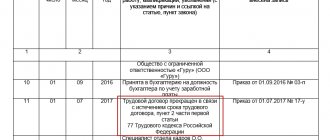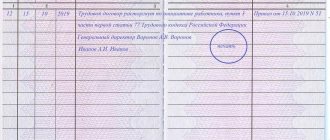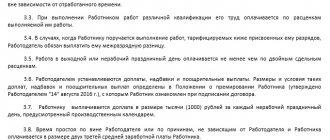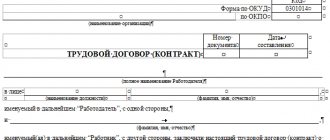In Art. 57 of the Labor Code of the Russian Federation provides a list of mandatory information for inclusion in an employment contract. It is important that it contains:
1. Full name employee and employer's name.
2. Information about documents proving the identity of the employee and the employer - an individual.
3. Employer's TIN.
4. Information about the employer’s representative who signed the employment contract, and the basis on which he is vested with the appropriate powers.
In some cases, the head of the company delegates the authority to conclude an employment contract to the HR director, head of the human resources department or chief accountant by proxy. In Part 6 of Art. 20 of the Labor Code of the Russian Federation explains when the rights and obligations of the employer are exercised in labor relations:
- an individual who is an employer;
- governing bodies of a legal entity (organization) or persons authorized by them, other persons authorized to do so in accordance with federal law and other regulatory legal acts of the Russian Federation, laws and other regulatory legal acts of constituent entities of the Russian Federation, regulatory legal acts of local government bodies, constituent documents organizations and local regulations.
A power of attorney is not a local regulatory act; it is needed to carry out transactions with third parties. In this case, it is important for the employer to regulate relations within the organization, and this is done through local regulations. This aspect should be reflected in the preamble to the employment contract. It is important not to forget the rule: whoever is indicated in the preamble is also indicated in the signatures of the parties.
5. Place and date of conclusion of the employment contract.
Employers often make a mistake in wording: instead of “date of conclusion of the employment contract” they write “date of drawing up the employment contract”.
In accordance with Part 3 of Art. 57 of the Labor Code of the Russian Federation, the missing information is entered in pen directly into the text of the employment contract.
Article 56. Concept of an employment contract. Parties to the employment contract
An employment contract is an agreement between an employer and an employee, according to which the employer undertakes to provide the employee with work for a specified labor function, to provide working conditions provided for by labor legislation and other regulatory legal acts containing labor law norms, a collective agreement, agreements, local regulations and by this agreement, to pay the employee wages in a timely manner and in full, and the employee undertakes to personally perform the labor function defined by this agreement and to comply with the internal labor regulations in force for this employer.
(Part one as amended by Federal Law No. 90-FZ dated June 30, 2006)
The parties to the employment contract are the employer and the employee.
Employer's liability
An employment contract is a basic document of labor legislation. It is designed to protect the rights of workers, and this is the very first “goal” of the inspection of the State Labor Inspectorate. Above we wrote about what must be included in it. Now let us briefly list the amount of fines that the director and the company will have to pay for violations in the execution of employment contracts. According to Article 5.27 of the Code of Administrative Offenses of the Russian Federation, for violations in the field of labor relations, the amounts of fines are:
- for the head of the enterprise - 10,000–20,000 rubles;
- for a legal entity - 50,000–100,000 rubles;
- for individual entrepreneurs - 5,000–10,000 rubles.
Standard form of an employment contract for micro-enterprises (form)
Employment contract with an employee (completed sample)
Article 57. Contents of the employment contract
(as amended by Federal Law No. 90-FZ of June 30, 2006)
The employment contract specifies:
surname, name, patronymic of the employee and the name of the employer (surname, name, patronymic of the employer - an individual) who entered into an employment contract;
information about documents proving the identity of the employee and the employer - an individual;
taxpayer identification number (for employers, with the exception of employers - individuals who are not individual entrepreneurs);
information about the employer’s representative who signed the employment contract and the basis on which he is vested with the appropriate powers;
place and date of conclusion of the employment contract.
The following conditions are mandatory for inclusion in an employment contract:
place of work, and in the case when an employee is hired to work in a branch, representative office or other separate structural unit of the organization located in another area - place of work indicating the separate structural unit and its location;
labor function (work according to the position in accordance with the staffing table, profession, specialty indicating qualifications; specific type of work assigned to the employee). If, in accordance with this Code and other federal laws, the performance of work in certain positions, professions, specialties is associated with the provision of compensation and benefits or the presence of restrictions, then the names of these positions, professions or specialties and the qualification requirements for them must correspond to the names and requirements specified in qualification reference books approved in the manner established by the Government of the Russian Federation;
(as amended by Federal Law No. 13-FZ dated February 28, 2008)
the date of commencement of work, and in the case where a fixed-term employment contract is concluded, also the period of its validity and the circumstances (reasons) that served as the basis for concluding a fixed-term employment contract in accordance with this Code or other federal law;
terms of remuneration (including the size of the tariff rate or salary (official salary) of the employee, additional payments, allowances and incentive payments);
working hours and rest hours (if for a given employee it differs from the general rules in force for a given employer);
compensation for hard work and work under harmful and (or) dangerous working conditions, if the employee is hired under appropriate conditions, indicating the characteristics of working conditions in the workplace;
conditions that determine, in necessary cases, the nature of the work (mobile, traveling, on the road, other nature of work);
a condition on compulsory social insurance of the employee in accordance with this Code and other federal laws;
other conditions in cases provided for by labor legislation and other regulatory legal acts containing labor law norms.
If, when concluding an employment contract, it did not include any information and (or) conditions from those provided for in parts one and two of this article, then this is not a basis for recognizing the employment contract as not concluded or for its termination. The employment contract must be supplemented with missing information and (or) conditions. In this case, the missing information is entered directly into the text of the employment contract, and the missing conditions are determined by an annex to the employment contract or a separate agreement of the parties, concluded in writing, which are an integral part of the employment contract.
The employment contract may provide for additional conditions that do not worsen the employee’s position in comparison with established labor legislation and other regulatory legal acts containing labor law norms, collective agreements, agreements, local regulations, in particular:
on clarification of the place of work (indicating the structural unit and its location) and (or) the workplace;
about the test;
on non-disclosure of secrets protected by law (state, official, commercial and other);
on the employee’s obligation to work after training for no less than the period established by the contract, if the training was carried out at the expense of the employer;
on the types and conditions of additional employee insurance;
on improving the social and living conditions of the employee and his family members;
on clarification, in relation to the working conditions of a given employee, of the rights and obligations of the employee and the employer established by labor legislation and other regulatory legal acts containing labor law norms.
By agreement of the parties, the employment contract may also include the rights and obligations of the employee and employer established by labor legislation and other regulatory legal acts containing labor law norms, local regulations, as well as the rights and obligations of the employee and employer arising from the terms of the collective agreement and agreements . Failure to include any of the specified rights and (or) obligations of the employee and employer in the employment contract cannot be considered as a refusal to exercise these rights or fulfill these obligations.
Conditions are optional, but useful
There may not be any additional terms of the contract at all. It depends on the needs of the employer and his openness. For example, if you hire a person to work in a separate unit located in another area, you should definitely clarify the work address. Optional items include information about the probationary period, access to commercial or official secrets.
It is also possible to include terms for payment for studies in this section if the applicant is already studying or there is a preliminary agreement with the employer that the studies will be paid for in full or in part. The employment contract must specify the conditions under which the employer agrees to train the employee. As a rule, the employer who paid for the training requires the employee to work for a certain time in the organization after completing the training course (three years, five years, another period) in order to justify the expenses incurred. If an employee breaks the agreement and quits on his own initiative before the end of the agreed period of work, he must reimburse the employer for training costs - usually in proportion to the time not worked.
Whatever points you include in the contract, remember one thing: the parties to the employment contract must come to an agreement, which means that the applicant can also make suggestions on the content of the document. By refusing to cooperate, an overly principled employer risks losing a valuable specialist whose search has already cost the company time and money.
Article 58. Duration of the employment contract
Employment contracts can be concluded:
1) for an indefinite period;
2) for a certain period of not more than five years (fixed-term employment contract), unless a different period is established by this Code and other federal laws.
A fixed-term employment contract is concluded when the employment relationship cannot be established for an indefinite period, taking into account the nature of the work to be done or the conditions for its implementation, namely in the cases provided for in part one of Article 59 of this Code. In the cases provided for in part two of Article 59 of this Code, a fixed-term employment contract may be concluded by agreement of the parties to the employment contract without taking into account the nature of the work to be performed and the conditions for its implementation.
(Part two as amended by Federal Law No. 90-FZ of June 30, 2006)
If the employment contract does not specify the duration of its validity, the contract is considered to be concluded for an indefinite period.
In the event that neither party has requested termination of a fixed-term employment contract due to its expiration and the employee continues to work after the expiration of the employment contract, the condition on the fixed-term nature of the employment contract loses force and the employment contract is considered concluded for an indefinite period.
(Part four as amended by Federal Law No. 90-FZ of June 30, 2006)
An employment contract concluded for a specific period in the absence of sufficient grounds established by the court is considered concluded for an indefinite period.
(as amended by Federal Law No. 90-FZ of June 30, 2006)
It is prohibited to conclude fixed-term employment contracts in order to evade the provision of rights and guarantees provided for employees with whom an employment contract is concluded for an indefinite period.
(as amended by Federal Law No. 90-FZ of June 30, 2006)
How to draw up an agreement
There are no special criteria for the execution of the agreement, as well as for its text: it can be written on a regular blank sheet of any convenient format or on company letterhead, by hand or printed on a computer.
Only one condition must be strictly observed: the additional agreement must have “living” signatures of both parties.
If the employing organization uses stamps in its work to endorse documentation, then the agreement form must be stamped. The document must be prepared in two identical copies - one of them remains with the employer, the second is given to the employee.
Article 59. Fixed-term employment contract
(as amended by Federal Law No. 90-FZ of June 30, 2006)
A fixed-term employment contract is concluded:
for the duration of the performance of the duties of an absent employee, whose place of work is retained in accordance with labor legislation and other regulatory legal acts containing labor law norms, a collective agreement, agreements, local regulations, and an employment contract;
for the duration of temporary (up to two months) work;
to perform seasonal work, when, due to natural conditions, work can only be carried out during a certain period (season);
with persons sent to work abroad;
for carrying out work that goes beyond the normal activities of the employer (reconstruction, installation, commissioning and other work), as well as work related to a deliberately temporary (up to one year) expansion of production or the volume of services provided;
with persons entering work in organizations created for a predetermined period or to perform a predetermined job;
with persons hired to perform obviously defined work in cases where its completion cannot be determined by a specific date;
to perform work directly related to the internship and professional training of the employee;
in cases of election for a certain period to an elected body or to an elective position for paid work, as well as employment related to the direct support of the activities of members of elected bodies or officials in state authorities and local self-government bodies, in political parties and other public associations;
with persons sent by employment services to temporary work and public works;
with citizens sent to perform alternative civil service;
in other cases provided for by this Code or other federal laws.
By agreement of the parties, a fixed-term employment contract may be concluded:
with persons entering work for employers - small businesses (including individual entrepreneurs), the number of employees of which does not exceed 35 people (in the field of retail trade and consumer services - 20 people);
with age pensioners entering work, as well as with persons who, for health reasons, in accordance with a medical certificate issued in the manner established by federal laws and other regulatory legal acts of the Russian Federation, are allowed to work exclusively of a temporary nature;
with persons entering work in organizations located in the Far North and equivalent areas, if this is related to moving to the place of work;
to carry out urgent work to prevent disasters, accidents, accidents, epidemics, epizootics, as well as to eliminate the consequences of these and other emergency circumstances;
with persons elected through a competition to fill the relevant position, conducted in the manner established by labor legislation and other regulatory legal acts containing labor law norms;
with creative workers of the media, cinematography organizations, theaters, theatrical and concert organizations, circuses and other persons involved in the creation and (or) performance (exhibition) of works, in accordance with the lists of works, professions, positions of these workers, approved by the Government of the Russian Federation Federation, taking into account the opinion of the Russian Tripartite Commission for the Regulation of Social and Labor Relations;
(as amended by Federal Law No. 13-FZ dated February 28, 2008)
with managers, deputy managers and chief accountants of organizations, regardless of their legal forms and forms of ownership;
with persons studying full-time;
with crew members of sea vessels, inland navigation vessels and mixed (river-sea) navigation vessels registered in the Russian International Register of Vessels;
(paragraph introduced by Federal Law dated November 7, 2011 N 305-FZ)
with persons applying for part-time work;
in other cases provided for by this Code or other federal laws.
What documents must an employee present when applying for a job?
The documents necessary for an employee to conclude an employment contract with the employer are provided for in Art. 65 Labor Code of the Russian Federation:
- passport or other identity document;
- insurance certificate of compulsory pension insurance (SNILS);
- employment history;
- military registration documents - for those liable for military service and persons subject to conscription for military service;
- a document on education and (or) qualifications or the presence of special knowledge - when applying for a job that requires special knowledge or special training;
- when applying for a job to which persons with a criminal record are not allowed - a certificate of no criminal record.
The list of documents for employment is determined by law
In some cases, taking into account the specifics of the work, the legislation may require the presentation of additional documents. It is prohibited to require from a person applying for a job documents that are not provided for by law.
According to the work book, there may be the following options:
- a contract for part-time work is concluded - you do not need to provide a work book;
- a person gets a job for the first time and does not have a work book - the work book and SNILS are issued by the employer;
- the work book is lost or damaged - upon a written application from the employee, the employer issues a new work book.
Article 61. Entry into force of an employment contract
An employment contract comes into force from the day it is signed by the employee and the employer, unless otherwise established by federal laws, other regulatory legal acts of the Russian Federation or the employment contract, or from the day the employee is actually admitted to work with the knowledge or on behalf of the employer or his representative.
(as amended by Federal Law No. 90-FZ of June 30, 2006)
The employee is obliged to begin performing his job duties on the date specified in the employment contract.
If the employment contract does not specify the start date of work, the employee must begin work on the next working day after the contract enters into force.
(as amended by Federal Law No. 90-FZ of June 30, 2006)
If the employee does not start work on the start day of work established in accordance with part two or three of this article, then the employer has the right to cancel the employment contract. A canceled employment contract is considered unconcluded. Cancellation of an employment contract does not deprive the employee of the right to receive benefits for compulsory social insurance in the event of an insured event during the period from the date of conclusion of the employment contract until the day of its cancellation.
(Part four as amended by Federal Law No. 90-FZ of June 30, 2006)





